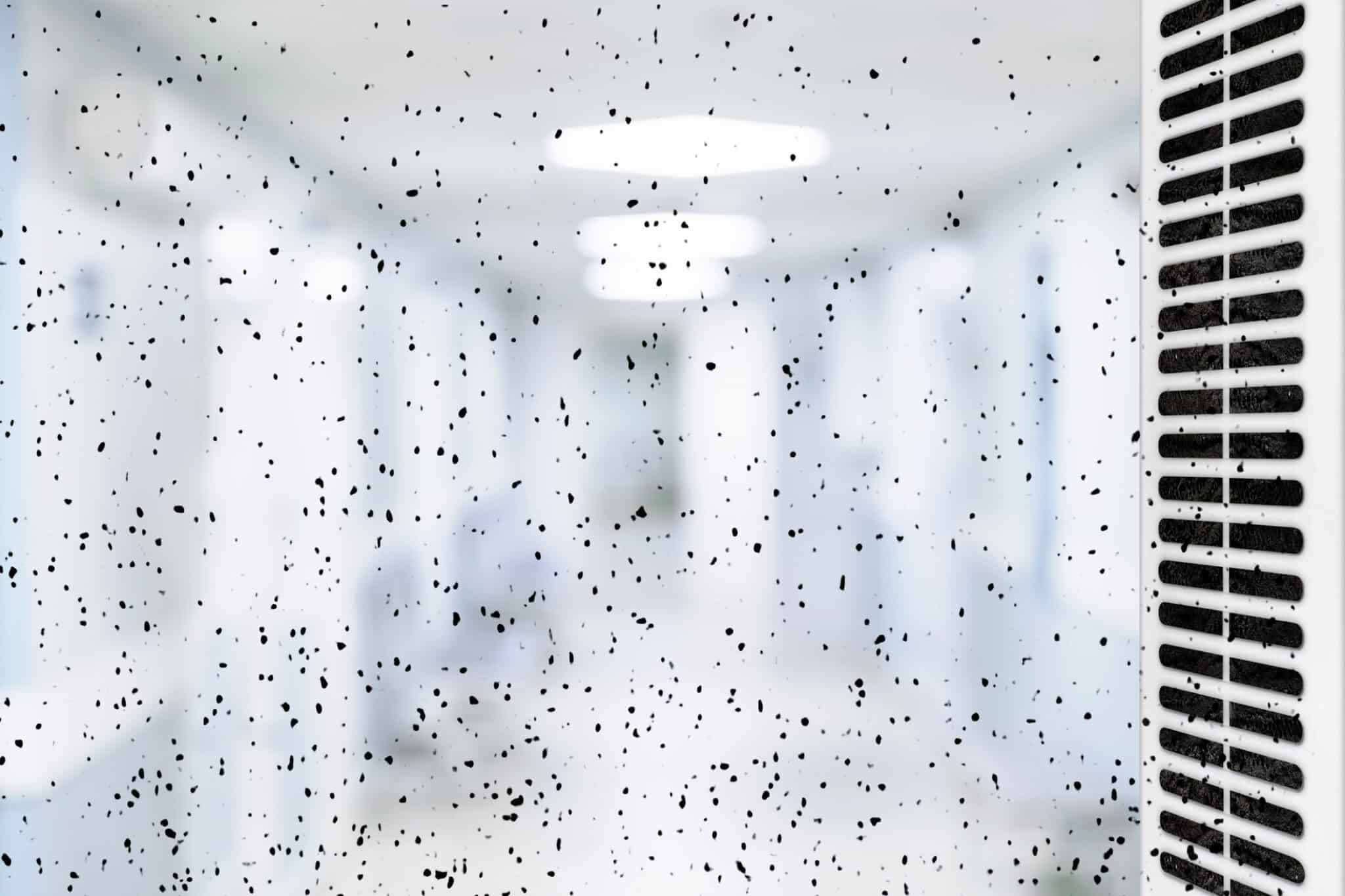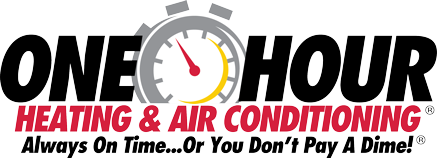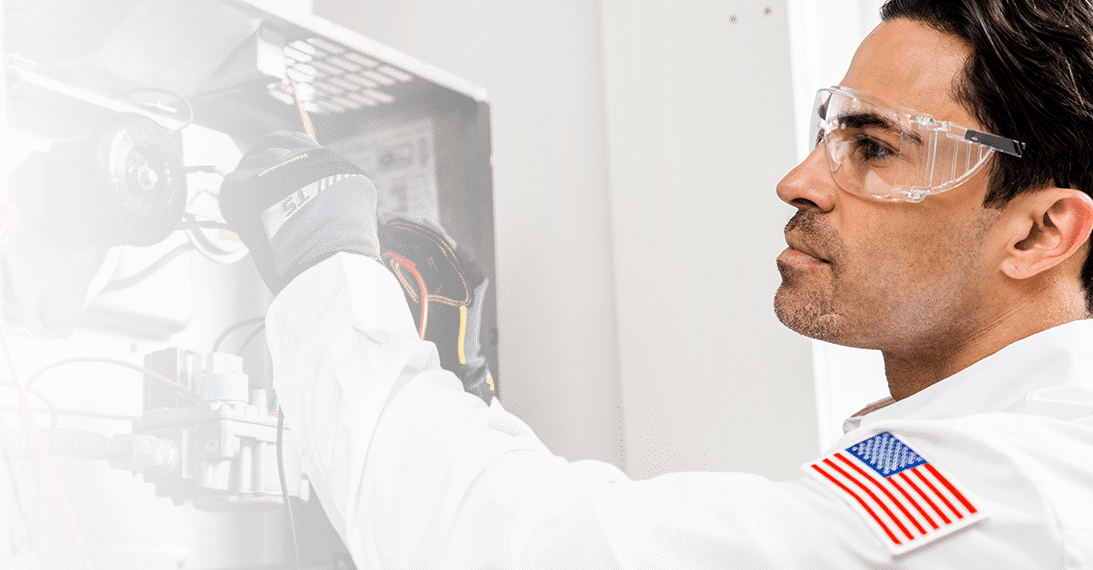Indoor air quality impacts your health and comfort. Indoor air can be 2-5 times more polluted than outdoor air. To improve it, keep good airflow, maintain humidity between 30-50%, use air purifiers, and change HVAC filters often. Smart air monitors can also help by spotting pollutants in real time.
Why Indoor Air Quality Matters
Have you ever thought about what’s in the air inside your home?
The air inside can be 2-5 times more polluted than outdoor air, and in some cases, it can be 100 times worse, according to the EPA.
That means the air in your Georgetown, TX home could be packed with pollutants—even if it looks clean.
Poor indoor air quality isn’t just about comfort.
It can lead to allergies, headaches, fatigue, and even serious breathing issues.
Dust, pet dander, mold spores, and VOCs (volatile organic compounds) float around in the air you breathe every day.
If you have asthma or other respiratory issues, poor air quality can make things even worse.
But it’s not just about health—it affects how your home feels, too.
Ever walked into a room that feels stuffy, no matter how clean it looks?
That usually means poor air circulation.
Fresh, clean air makes your home feel more inviting, helps reduce odors, and even keeps your HVAC system running more efficiently.
Keeping your air clean isn’t just a nice-to-have—it’s a must.
By knowing what’s in your air and taking steps to improve it, you can create a healthier, more comfortable home for yourself and your family.

Common Indoor Air Pollutants and Where They Come From
The air in your home might not be as clean as you think.
Everyday items can release pollutants that affect your health without you even realizing it, leading to poor Indoor Air Quality.
One of the biggest culprits? Volatile Organic Compounds (VOCs).
These harmful chemicals come from paints, cleaning products, and even furniture.
Breathing them in over time can lead to headaches, dizziness, and other health issues, significantly affecting Indoor Air Quality.
Then there’s mold and mildew.
If your home has too much moisture and not enough airflow, mold can grow and release spores into the air.
Leaky pipes, condensation, and high humidity make the problem even worse, triggering allergies and breathing problems.
You also have to deal with dust, pet dander, and allergens.
No matter how often you clean, tiny particles keep floating through the air.
They can make asthma worse, cause sneezing fits, and irritate your lungs—especially if you have allergies.
All these pollutants can add up, making indoor air quality a major concern.
The good news? You can improve the air in your home by increasing ventilation, using air purifiers, and keeping up with regular HVAC maintenance.
If you need expert help, One Hour Air Conditioning & Heating of Central Texas in Georgetown, TX, is ready to assist.
Health Effects of Poor Indoor Air Quality
Bad air inside your home isn’t just annoying—it can harm your health.
Breathing in polluted air can trigger allergies, make asthma worse, and even cause serious long-term issues.
Things like dust, pet dander, and mold spread through your home’s air, making it harder to breathe and irritating your lungs.
The immediate effects can hit fast—headaches, dizziness, or fatigue.
Ever walked into a musty room and felt your eyes or throat burn?
That’s poor air circulation.
Some people react more than others, but over time, breathing in contaminated air can weaken your immune system and make you sick more often.
The long-term risks are even worse.
Continuous exposure to VOCs, mold, and pollution can lead to serious lung diseases and even heart problems.
Kids, seniors, and people with health conditions suffer the most.
If you’re dealing with constant allergies or unexplained fatigue, your home’s indoor air quality might be to blame.
One Hour Air Conditioning & Heating of Central Texas provides expert solutions in Georgetown, TX, to help you breathe cleaner air and stay healthier.
What Affects Your Indoor Air Quality
A few key factors impact the air you breathe at home.
Understanding them can help you create a healthier space.
Humidity control is one of the biggest factors.
Too much moisture can lead to mold and dust mites, while air that’s too dry can irritate your throat and skin.
The best range for indoor humidity is between 30-50%.
If your home feels too damp or too dry, a humidifier or dehumidifier can help keep things balanced.
Need expert advice? Check out our humidifier services.
Ventilation matters too.
Fresh air keeps your space from feeling stuffy and helps clear out pollutants.
Poor airflow traps allergens, odors, and harmful particles like VOCs (volatile organic compounds).
To improve ventilation, open windows when the weather allows, use exhaust fans in damp areas, and make sure your HVAC system is doing its job.
Speaking of your HVAC system, it plays a big role in indoor air quality.
A well-maintained system filters out pollutants, keeps air moving, and prevents moisture buildup.
Changing the filter regularly, scheduling professional inspections, and cleaning your ducts all help keep the air in your home fresh.
By managing humidity, improving ventilation, and keeping your HVAC system in top shape, you can enjoy cleaner, healthier air in Georgetown, TX, all year long.
How to Improve Indoor Air Quality in Your Home
Want fresher, cleaner air at home?
Start with better ventilation.
Stale indoor air traps dust, pet dander, and chemicals, making it more polluted than you’d think.
The easiest fix? Open windows when the weather allows and use exhaust fans in your kitchen and bathroom.
Letting in fresh air helps push out pollutants and bring in cleaner air.
Another great option is air purification and filtration.
A good HEPA filter in your HVAC system traps allergens, while activated carbon filters take care of odors and chemicals.
Adding a standalone air purifier can also help clear out tiny particles that linger in the air.
Cutting down on indoor pollution sources makes a big impact too.
Stuff like aerosol sprays, candles, and harsh cleaning chemicals release harmful compounds into the air.
Switching to low-VOC household products and natural cleaners helps reduce unnecessary pollutants.
Finally, keeping your HVAC system in top shape improves indoor air quality over time.
Leaky air ducts let in dust and allergens, making the system work harder while worsening contamination.
Getting air duct sealing keeps your air clean by stopping pollutants from spreading.
By following these steps, you’ll breathe easier knowing your home in Georgetown, TX, has fresher, healthier air.
How Your HVAC System Affects Indoor Air Quality
Your HVAC system plays a huge role in the air you breathe at home.
If it’s not well-maintained, it can spread dust, allergens, and other pollutants, making allergies worse and the air feel heavy.
That’s why regular HVAC upkeep is key to keeping the air inside your home fresh and clean.
One of the simplest steps? Change your filters every 1-3 months. This helps trap dust, pollen, and other particles before they circulate through your home.
But filters aren’t the only solution.
Upgrading to high-efficiency filters or adding UV air purifiers can drastically cut down indoor air pollution.
HEPA filters, for example, capture 99.97% of airborne particles, keeping them from settling in your home.
UV purifiers go a step further by killing bacteria, mold spores, and even viruses lurking in your ductwork.
Speaking of ducts, they can collect dust, pet dander, and even mold over time, which can clog airflow and spread contaminants.
Professional duct cleaning gets rid of this buildup, improving both air quality and HVAC efficiency.
If your ducts have leaks, sealing them helps keep outdoor pollutants and excess humidity from creeping in.
Not sure if your ducts need work? Check out proper ductwork maintenance to keep your home’s air as clean as possible.
When you take care of your HVAC system, you’re not just making your home more comfortable—you’re improving indoor air quality too.
Homeowners in Georgetown, TX, can benefit from expert HVAC services to ensure cleaner, healthier air indoors.
Why a Professional Indoor Air Quality Check Matters
I used to think the air inside my home wasn’t a big deal.
But the truth is that the environment in your house can affect your health more than you realize.
You can make some changes on your own, but a professional assessment gives you real answers and long-term solutions.
What Happens During an Air Quality Inspection?
A professional indoor air quality check looks at everything affecting the air in your home.
This includes allergens, chemicals from household products (VOCs), humidity levels, and even harmful gases like radon.
Testing can uncover hidden issues, like mold spores or built-up dust, that regular cleaning won’t fix.
How Expert Advice Helps You Breathe Easier
Trying to fix air issues on your own can feel like guessing.
A professional assessment gives you custom solutions instead of one-size-fits-all fixes.
Experts can suggest things like better filters, humidity control, or duct cleaning to remove pollutants right at the source.
Finding the Right Air Quality Experts in Georgetown, TX
Not every HVAC technician knows how to handle air concerns.
If you’re in Georgetown, TX, the team at One Hour Air Conditioning & Heating of Central Texas offers full inspections and personalized solutions.
They make sure your HVAC system helps keep the air in your home clean and healthy.
Best Air Purifiers and Filters for Indoor Air Quality
Finding the right air purifier and filter makes a big difference in keeping the air in your home clean and fresh.
Not all filters work the same way, so knowing what each type does can help you pick the best one.
HEPA filters are one of the best choices.
They remove at least 99.97% of tiny particles as small as 0.3 microns.
This means they trap dust, pollen, pet dander, and even some bacteria.
If you or your family have allergies, a HEPA filter can make a big impact on your indoor air quality.
If odors or chemical fumes are a problem, activated carbon filters are a great option.
These filters soak up gas-based pollutants like smoke, VOCs, and household smells, leaving your air fresher and safer to breathe.
For extra protection, UV air purifiers use ultraviolet light to kill bacteria, viruses, and mold spores.
While they don’t capture particles like other filters, they help neutralize airborne germs, adding another level of defense.
The best results often come from using a mix of these technologies.
Investing in quality air purifiers and filters keeps allergens and pollutants under control, ensuring a healthier environment in your Georgetown, TX home.
How Outdoor Air Affects Your Home’s Air Quality
Most of us don’t realize how much outdoor air affects the air inside our homes.
Car fumes, factory pollution, and seasonal allergens can sneak in and lower the freshness of the air indoors.
Weather plays a big role too.
High humidity can cause mold, while dry air kicks up dust and irritants.
During wildfire season or allergy-heavy months, outdoor particles can get in through windows, doors, and HVAC systems.
Want to keep that air clean?
Start by sealing up any gaps around windows and doors.
Upgrading your HVAC air filters helps too—HEPA filters can trap fine particles.
Regular air duct cleaning also stops outdoor pollutants from spreading inside.
Looking for a natural way to help?
Indoor plants like spider plants, peace lilies, and snake plants can remove pollutants like formaldehyde and benzene.
But while plants help, they can’t replace good ventilation and filtration.
For a stronger solution, try air purifiers or whole-home HVAC upgrades designed to improve indoor air quality.
An expert from One Hour Air Conditioning & Heating of Central Texas can help find the right system to keep your air fresh—no matter what’s happening outside in Georgetown, TX.
Smart Home Tech to Improve Indoor Air Quality
I’ve never had an easier time keeping my home’s air fresh, thanks to smart home tech.
Smart air quality monitors track pollutants like dust, VOCs, and carbon dioxide, giving real-time updates on indoor air conditions.
These devices sync with mobile apps to send alerts when air quality drops and even suggest fixes—like opening windows or replacing filters.
Then, there are smart HVAC systems, which take air management to the next level.
With built-in filters and automation, they keep the temperature, humidity, and airflow just right.
Some even adjust fan speeds and kick on air purifiers when they detect pollution.
It gets even better when you connect everything to Alexa or Google Home.
If you live in Georgetown, TX, you can adjust humidity, control purifiers, and check air conditions with simple voice commands.
If you care about indoor air quality, smart home tech makes it effortless.
Real-time tracking and automated filtration mean you always breathe fresh, healthy air.
Thinking about upgrading?
Now’s the time.

How to Keep Your Home’s Air Clean for Good
I know how important indoor air quality is for my health and comfort.
That’s why I stay on top of regular maintenance.
Dust, mold, and other pollutants build up fast if I don’t, making my home feel stuffy and even hurting my HVAC system.
A little routine care keeps my air fresh and easy to breathe.
Cleaning often makes a big difference.
I make sure to vacuum carpets, wipe down surfaces, and change my HVAC filters every 1-3 months.
This helps keep dust mites, pet dander, and other allergens from floating around my home.
Keeping humidity under control helps too.
I try to keep indoor humidity between 30-50% to stop mold from growing and to cut down on dust mites.
A humidifier or dehumidifier can keep things balanced, especially in areas where moisture builds up—the kitchen, bathroom, or basement.
Good ventilation also plays a huge part in keeping mold away.
My HVAC system needs regular checkups.
I schedule seasonal tune-ups with One Hour Air Conditioning & Heating of Central Texas so everything runs smoothly.
Clean filters and clear ductwork improve airflow, keep out pollutants, and help my HVAC system last longer.
By staying on top of these small tasks, I keep indoor air quality at its best all year long without any problems getting in the way.
A little effort goes a long way, and I can breathe easier knowing my home is in great shape.
Indoor Air Quality FAQs
What causes poor indoor air quality?
Bad indoor air quality usually comes from poor ventilation, too much humidity, and common pollutants like dust, pet dander, chemicals from household products, and mold.
How do I know if my air quality is bad?
If you have constant allergies, musty smells, lots of dust, frequent headaches, or trouble breathing indoors, the air in your home might not be clean. Smart air monitors can also track pollutants in real time.
Do air purifiers really work?
Yes! Air purifiers with HEPA filters trap dust, pet dander, and pollen. Some also have activated carbon to remove odors and harmful chemicals.
How often should I change my HVAC air filters?
Change them every 1-3 months, depending on how often you use your system, if you have pets, and local environmental factors. A dirty filter blocks airflow and spreads pollutants.
How can I control humidity and stop mold?
Keep indoor humidity between 30-50% with a dehumidifier or HVAC system. Make sure bathrooms and kitchens have good ventilation to reduce moisture buildup, especially in places like Georgetown, TX, where humidity levels can fluctuate.





